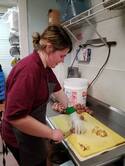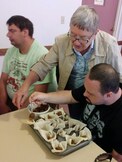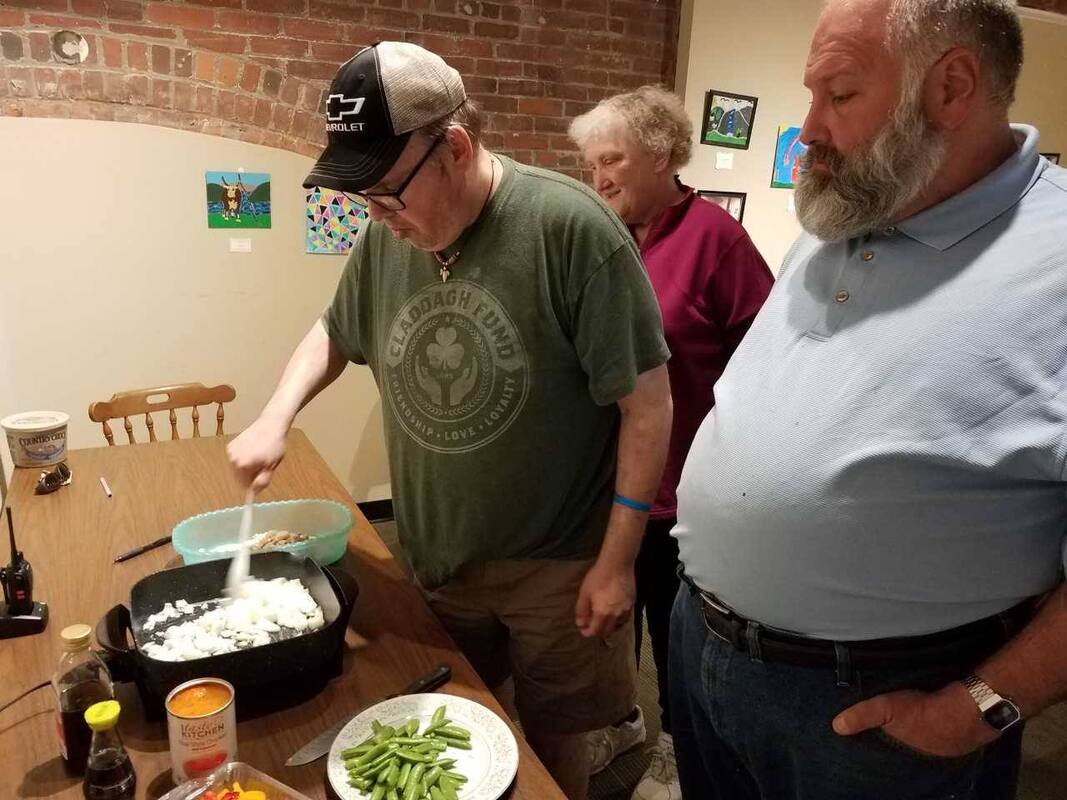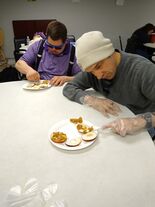 The last photo taken at GBS Dover before the pandemic shut down. The last photo taken at GBS Dover before the pandemic shut down. Food. Nothing brings people together like a meal. Cooking is a vital skill for independence. It comes as no surprise that cooking has always been a staple at Great Bay Services, as we strive to promote independence in our members, and integrate them in to the larger community. At one time, Great Bay Services acted as a more sheltered program, unlike the community-based programs of today. We maintained our own cafeteria for the clients - and by the clients. Our staff worked side-by-side with clients prepping for meals every day. For several years, we also worked in partnership with Cross Roads House, the homeless shelter in Portsmouth. The shelter operates a commercial kitchen and provides three meals a day to their residents. Our clients volunteered in the kitchen, supporting a great nonprofit and building good job skills. Even after our move to Dover, and opening the Sanford office, cooking continued at GBS. Through a partnership with St John's, we would cook regularly in their kitchen. Our Sanford members grew their own vegetables at the Sanford Community Garden before using them in delicious and healthy meals. Recipes are usually around a theme like holidays or seasons. Staff taught health and nutrition along with the cooking classes - with the occasional treat thrown in. A fun job perk of working at GBS was getting to try all the recipes our members created. The last activity we did was a cooking class. The Dover members created a snack together on March 13, 2020 - the final day before GBS shut down community support programs for the pandemic. Even now, we're still cooking. Our online Zoom cooking classes are immensely popular with members. Of course we also have members who do prep work in professional kitchens at area restaurants, in addition to helping with other jobs that keep restaurants organized, clean and safe. With this long-time connection to food, it was a natural fit for Great Bay to create a cooking-based event for our 2021 fundraiser. We're excited to team up with Chef Justin Walker of Walkers Maine for an online cooking demonstration on May 21. Join us at 7:00pm, tickets are just $30 per household and available here. All proceeds support all our important programs - including cooking - for local adults with disabilities. - Elizabeth Worboys Burr, Director of Mission Advancement 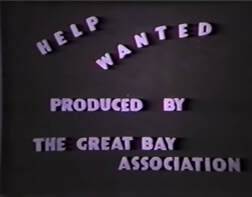 Imagine living in a ward with 200 other people. You all sleep in just two rooms - filled with rows of beds. There are no curtains on the windows. Bathrooms have no stalls or even the merest privacy. For all of you, there is one television and one pool table for entertainment. You rarely go outside. This was life in the Laconia State School. First opened in 1903 as the NH School for the Feeble Minded, the institution was designed as a place for children with disabilities. It began with a population of 58 people, aged three to 21. They were called inmates. By 1916 there were 293 residents but the state refused to increase their funding, despite the obvious need. Overcrowding was a major issue. Staff received little, if any, training. If parents or family members wanted to visit their loved ones in Laconia, they were told they could take them out, but people from the outside were not invited in. In 1952, Richard Hungerford came on as Laconia's superintendent. He was not a medical doctor like the previous directors, but a teacher with a new philosophy who brought a reform movement. He did not discourage parents from visiting, he invited them. Mr. Hungerford wanted to shine a light on the school and empower the parents to help Laconia get the help and funding it needed. In 1956 he even invited groups to come in and photograph the conditions. The Great Bay Association came in with a film crew. The Great Bay Association (later renamed Great Bay Services) was a recently-formed group of parent advocates from the Seacoast New Hampshire area. The association produced a film called Help Wanted, which followed life in the institution, for the first time showing the outside world what Laconia had become. As the film's narrator asks "is this living or mere existence?". The film highlights the indignities inflicted on the residents - like four broken toilets, without seats, being shared in a ward with 43 men. Women who did unpaid work, helping in the children's ward. Working in the laundry included dangerous conditions, and lack of organizations led to frequently lost clothing. There was no space for personal possessions or the comforts of home. An outdated and too-small kitchen was used to create the food for all the residents, leading to shortages and unsafe food. The film closes with the remarks "can we not unite and secure more trained personnel to help Mr Hungerford and the dedicated work he is doing under tremendous handicaps? It is hoped that all who witness this film will come to a fuller understanding of the extent of the problem now existing at Laconia, NH". The film was shown to community groups around the state. For the first time, the state legislature faced outside pressures to support Laconia State School. Trustees of Laconia removed Hungerford in 1960, mostly because of his contentious relationship with the Legislature. They feared it would overall hurt their ability to support the school. However, thanks to Help Wanted and an expose by The Portsmouth Herald, the public were now aware and invested in the condition at Laconia and the movement continued to grow. Hungerford and the parents' association succeeded in bringing some improvements to the school. The two following superintendents - Arthur Toll and Richard Melton - followed the path started by Hungerford. However overcrowding, funding and staffing issues continued. In 1978 the parents' association, with the support of Dr. Melton, brought a lawsuit against the state of New Hampshire. In 1980, a judge ordered the state to provide "the least restrictive care possible" for the residents, and required an immediate reduction in the size of the institution. This "action for independence" affected not only for Laconia but those in community programs. It formed the area agencies and vendor agency system, which includes Great Bay Services, that we have today. On January 31, 1991, Laconia State School closed its doors permanently. This made NH the first state to close their institutions. Help Wanted is careful not to make Laconia's staff into villains. There are those few who took advantage of the situation, but most of the school's staff cared about their residents. The industry continues to constantly change, as people's understanding of those with disabilities improves. Our current "best practices" are constantly evolving, even today as we're learning to add remote technology as a way to effectively bring services to even more individuals. In 2009 another film crew visited the now derelict school, shooting the documentary Lost in Laconia. Footage from Help Wanted is used throughout the film. Lost in Laconia is available in its entirety on YouTube. While it details an important part of our history, the film vividly depicts life in the Laconia State School. It can be very difficult to watch. Great Bay Services has supported several members who lived at Laconia, or at some of the other state institutions in New Hampshire and Maine. We continue to move forward, to improve the lives of not only those we directly serve, but all those with disabilities. - Elizabeth Worboys Burr, Director of Mission Advancement  In a recent meeting, one of our trustees likened Great Bay Services to a flower growing from a sidewalk crack. Not only does this imagery well represent the resilience of our community in the past year, but the entire history of Great Bay Services. In the past, families of children with disabilities were faced with an impossible decision. If they were unable to care for their loved one at home, there were no additional supports available. Looking for guidance, they would turn to trusted advisors like doctors or teachers. The parents would all be told the same thing - put the child in an institution. In New Hampshire, this likely meant the Laconia State School. In Maine, it was Pineland Center. Even in the best conditions, these institutions were under-funded, under-staffed and over-crowded. These children would face a lifetime of neglect, in a grim building. A group of parents stood together and said - not my child. They met in the basement of a church in Durham and dreamed of a better life for their kids. On March 8, 1954 they officially incorporated into a nonprofit to form a school for children with disabilities. It was the first of its kind in the state. The very idea that these children could be educated, and they could be a part of society, was revolutionary. This group would do more than form the Great Bay School for their own children, they became advocates. Great Bay created the documentary "Help Wanted" which followed a day in the life of people living in the Laconia State School. The film was shown to community groups to educate the public and ask for their help in improving the conditions for people with disabilities. We became major players in a movement that would eventually shut down the institution system. Great Bay parents would lobby for bringing special education into the public schools. Again, the idea that these children could attend school with their peers was unheard of at the time. As the children of Great Bay grew up, the organization adapted to their needs. We created workshops and job training for our students as they became adults. These workshops accepted work from outside employers and provided a space where individuals with disabilities could earn a paycheck, and be a productive part of the community. Great Bay never stopped innovating. As the needs of our members and their families changed, so did we. The school grew into what is today our community supports for adults. Workshops are now our employment programs. Six years ago we expanded into Maine, which allowed us to offer independent living and case management supports as well. 2020 was just another hurdle for us, and given the history of GBS, it is no surprise we met it head on. We made the decision in March 2020 to suspend our in-person community supports. The decision was made for the good of our clients and our staff, without knowing what came next. Instead of fretting, our community services team planned. Within 72 hours we were back in operation with a remote program. Our clients and their families adapted just as quickly, and our Zoom classes were quickly full of familiar smiles. Jumping on a call with our clients is full of friends calling hello to each other, asking about their evening, their family. It feels like a morning at GBS, if it looks a bit different. It's thanks to the ingenuity of our staff and the determination of our clients and families that we continue on a strong path today. We're offering a diverse menu of online classes and activities - from STEM workshops to money management and ASL; yoga classes, sing-a-longs, trivia games and bingo. Our staff are leading one-on-one or small group activities like hiking, ice fishing, art en plein air, and more. As we approach our 67th anniversary next week, our founding families would be proud of the work that we carry on today. The dream of those nine families now supports more than 300 individuals. For more than six decades, even through a pandemic, Great Bay continues our commitment to those we serve. - Elizabeth Worboys Burr, Director of Mission Advancement Great Bay Services staff and our peers who also work with folks with Intellectual & Developmental Disabilities (IDD) are now receiving our first vaccination shots, and we are told to expect that soon vaccination shots will be available to everyone we support. Please note that we will not be delivering the vaccine on-site at GBS. Please ask your case manager and/or primary care physician for information about vaccine delivery. The decision of whether or not to get the COVID-19 vaccine is a personal one, and we at Great Bay Services recommend that you speak to your medical provider(s) and to your loved ones about this important decision. In order to assist you in having these conversations, we have compiled the following resources which may help you in thinking about and talking through the COVID-19 vaccine and related subjects.
- Pam Layne, Executive Director The beginning of a new year is a wonderful time for many people to look ahead to goals they want to accomplish over the next 12 months, but 2021 is beginning in the same unusual way that 2020 ended due to the pandemic. The uncertainty of when vaccines will be available to large numbers of people and questions about how this will affect our lives on a daily basis makes it difficult to look ahead. So, one way to adjust how we create goals this year is to focus on our personal wellness.
|
|
Great Bay Services New Hampshire
23 Cataract Avenue, Suite 1 Dover, NH 03820 603-842-5344 |
Great Bay Services Maine
61 Washington Street, Suite 4 Sanford, ME 04073 207-850-1053 Ext. 2001 |
DEI Statement
Great Bay Services was founded at the time that the US civil rights movement was being born and see our history as being tied to the fight for justice and equity. Throughout our 70-year history we have evolved and grown alongside major diversity legislations and societal changes. Disability is the forefront of our organization, but we encourage and celebrate all forms of diversity, fostering equity, inclusion, belonging, and accessibility for all. Creating an inclusive community where everyone has access to equal opportunities and feels they belong is vital to us as an organization – not just within Great Bay Services but in the world around us. We welcome and encourage all to live happy and healthy lives no matter who they are, where they come from, what they look like, their gender identity, sexual orientation, disability, socioeconomic status, or age.
Great Bay Services was founded at the time that the US civil rights movement was being born and see our history as being tied to the fight for justice and equity. Throughout our 70-year history we have evolved and grown alongside major diversity legislations and societal changes. Disability is the forefront of our organization, but we encourage and celebrate all forms of diversity, fostering equity, inclusion, belonging, and accessibility for all. Creating an inclusive community where everyone has access to equal opportunities and feels they belong is vital to us as an organization – not just within Great Bay Services but in the world around us. We welcome and encourage all to live happy and healthy lives no matter who they are, where they come from, what they look like, their gender identity, sexual orientation, disability, socioeconomic status, or age.
|
Links To Show Your Support
Auction & Gala Bowl-a-thon Donate Events NHGives Past Events Sponsorship Tickets & Merchandise |
Great Bay Services is a 501(c)3 Nonprofit.
All donations are directly used to support our services. EIN: 02-0242389
Our New Hampshire program is sponsored in part by the New Hampshire Council on Developmental Disabilities
|

